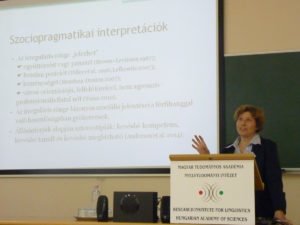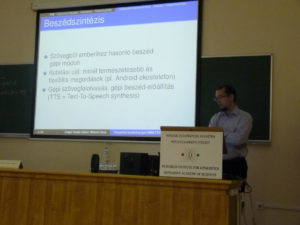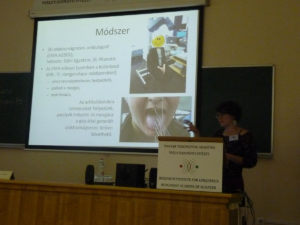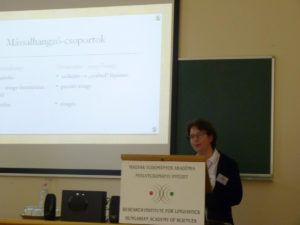Our group members presented several talks on various topics on the Speech Research 2016 Conference (Beszédkutatás 2016) at the Institute for Linguistics, MTA (Hungarian Academy of Sciences), Budapest.
Tamás talked about ultrasound tongue contour tracking. He introduced several softwares, and compared them with respect to their advances and limitations. He also presented his conjoint work with Géza Németh (BME TMIT) on speech synthesis. In their talk they emphasized the importance of modelling voiceless speech sounds in TTS systems and they introduced a new method for solving this problem in TTS. They also presented the results of a perception experiment which aimed at the evaluation of the newly created TTS system. Tamás also held a demonstration on ultrasound systems: he presented the operation of the ultrasound and its applications in phonetics and speech technology.
Alexandra and Tamás presented a study concerning the effect of irregular phonation on the evaluation of the speaker together with Karolina Takács (ELTE BTK).
There is still many open questions regarding the realization of the most frequent and multifunctional Hungarian discourse marker hát (literally: ‘well’). In their talk Alexandra and Ilona Csilla Dér (KRE) analyzed the prosodic structure of this discourse marker with respect to its functions in the discourse.
In high-pitched soprano singing, vowel production and the production of high pitch are in apparent conflict, thus vowel production in soprano singing is currently a hot topic in speech research. Andrea gave a talk about some new results on the articulation of high-pitched Hungarian vowels which was obtained in a 2-year project funded by TKA and DAAD. The project focused on the articulation of sung vowels in Hungarian and German and included Andrea, Alexandra, Márton Bartók (ELTE BTK), Julianna Jankovics (ELTE BTK), Zsófia Weidl (ELTE BTK), Reinhold Greisbach (Universität zu Köln) and Michelle Meier (Universität zu Köln). The analyses were carried out with electromagnetic articulography to which the EMA AG501 system was provided by the Phonetic Institute (IfL) at the University of Cologne.
Tekla presented a study on obstruent realizations and coarticulation in consonant clusters in spontaneous speech.





